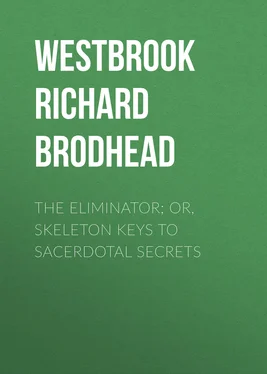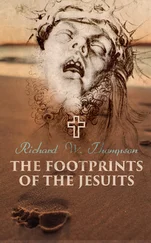Richard Westbrook - The Eliminator; or, Skeleton Keys to Sacerdotal Secrets
Здесь есть возможность читать онлайн «Richard Westbrook - The Eliminator; or, Skeleton Keys to Sacerdotal Secrets» — ознакомительный отрывок электронной книги совершенно бесплатно, а после прочтения отрывка купить полную версию. В некоторых случаях можно слушать аудио, скачать через торрент в формате fb2 и присутствует краткое содержание. Жанр: foreign_prose, foreign_religion, Философия, foreign_psychology, foreign_antique, на английском языке. Описание произведения, (предисловие) а так же отзывы посетителей доступны на портале библиотеки ЛибКат.
- Название:The Eliminator; or, Skeleton Keys to Sacerdotal Secrets
- Автор:
- Жанр:
- Год:неизвестен
- ISBN:нет данных
- Рейтинг книги:3 / 5. Голосов: 1
-
Избранное:Добавить в избранное
- Отзывы:
-
Ваша оценка:
- 60
- 1
- 2
- 3
- 4
- 5
The Eliminator; or, Skeleton Keys to Sacerdotal Secrets: краткое содержание, описание и аннотация
Предлагаем к чтению аннотацию, описание, краткое содержание или предисловие (зависит от того, что написал сам автор книги «The Eliminator; or, Skeleton Keys to Sacerdotal Secrets»). Если вы не нашли необходимую информацию о книге — напишите в комментариях, мы постараемся отыскать её.
The Eliminator; or, Skeleton Keys to Sacerdotal Secrets — читать онлайн ознакомительный отрывок
Ниже представлен текст книги, разбитый по страницам. Система сохранения места последней прочитанной страницы, позволяет с удобством читать онлайн бесплатно книгу «The Eliminator; or, Skeleton Keys to Sacerdotal Secrets», без необходимости каждый раз заново искать на чём Вы остановились. Поставьте закладку, и сможете в любой момент перейти на страницу, на которой закончили чтение.
Интервал:
Закладка:
Finally, let it not be overlooked that it will not, for many reasons, be possible much longer to keep the people in ignorance, and to palm off upon them myths for veritable history and a system of theology plainly at variance with the conclusions of science, the facts of history, and the spiritual and moral consciousness of every true and well-developed man. The schoolmaster is abroad, and the spirit of fearless investigation is in the air, and men will, sooner or later, find out what is true; and when they come to understand how they have been imposed upon by their cowardly teachers, a fearful reaction will be the result; and woe to the hypocrite and time-server when that time comes! It is therefore not only good principle, but good policy, to tell the whole truth now. The following copy of a book-notice well describes the prevalent policy regarding matters of faith:
“A theory of religious philosophy which is much commoner among us than most of us think, but which has never been expressed so fully or so attractively as in the story of Marius.
“‘Submit,’ it seems to say, ‘to the religious order about you, accept the common beliefs, or at least behave as if you accepted them, and live habitually in the atmosphere of feeling and sensation which they have engendered and still engender; surrender your feeling while still maintaining the intellectual citadel intact; pray, weep, dream with the majority while you think with the elect; only so will you obtain from life all it has to give, its most delicate flavor, its subtlest aroma.’” Against such a sham the writer heartily protests, as against the villainous maxim, quoted from memory, accredited to Aristotle: “ Think with the sages and philosophers, but talk like the common people.” Come what may, let us cease to profess what we have ceased to believe.
“The two learned people of the village,” says Dr. Oliver Wendell Holmes, telling of his fanciful Arrowhead Village, “were the rector and the doctor. These two worthies kept up the old controversy between the professions which grows out of the fact that one studies nature from below upward, and the other from above downward. The rector maintained that physicians contracted a squint which turns their eyes inwardly, while the muscles which roll their eyes upward become palsied. The doctor retorted that theological students developed a third eyelid—the nictitating membrane , which is so well known in birds, and which serves to shut out, not all light, but all the light they do not want. ”
The Presbyterians have provided for a revision of their creed, though they have stultified themselves by certain restrictions, shutting out the light they do not want! Let us hope that the time will soon come when men will be honest enough and brave enough to follow the truth wherever it may lead. Let there be perfect veracity above all things, more especially in matters of religion. It is not a question of courtesies which deceive no one. To profess what is not believed is immoral. Immorality and untruth can never lead to morality and virtue; all language which conveys untruth, either in substance or appearance, should be amended so that words can be understood in their recognized meanings, without equivocal explanations or affirmations. Let historic facts have their true explanation.
CHAPTER II. SACERDOTALISM IMPEACHED
“The heads thereof judge for reward, and the priests thereof teach for hire, and the prophets thereof divine for money.”—Micah 3: 11.
“Put me, I pray thee, into one of the priests’ offices, that I may eat a piece of bread.”—1 Sam. 2: 36.
THE cognomens priest, prophet, presbyter, preacher, parson, and pastor have certain things in common, and these titles may therefore be used interchangeably.
As far back as history extends, the office or order now represented by the clerical profession existed. It was as common among pagan tribes in the remotest periods as among Jews and Christians in more modern times. Service done to the gods by the few in behalf of the many is the primary idea of the priestly function. It has always and everywhere been the profession and prerogative of the priests to pretend to approach nearest to the gods and to propitiate them; on account of which they have always been supposed to have special influence with the reigning deity and to be the authorized expounders and interpreters of the divine oracles. The priesthood has always been a caste, a “holy order;” and it was no less so among ancient Jews than among modern Christians. In all churches clergymen ex-officio exercise certain sacred prerogatives. They occupy select seats in every sanctuary. They lead in every act of worship. They preside over every sacred ceremony. They exclusively administer the ordinances of religion. They baptize the children and give or withhold the “Holy Communion.” They celebrate our marriages, visit our sick, and conduct our funerals. In Romish churches and in some of our Protestant churches they pretend to pronounce “absolution” and to seal the postulant for the heavenly rest. It is not necessary, now and here, to speak of the evil influence that these pretensions exert upon the common people, nor of the light in which intelligent, thinking women and men commonly regard them; but it is appropriate to note the reflex influence which such assumptions have upon the clergy themselves, disqualifying them for such rational presentation of doctrinal truth as their hearers have a right to expect.
The pride of his order makes it humiliating for the priest to admit that what he does not know is worth knowing. Claiming to be the authorized expounder of God’s will, how can he admit that he can possibly be in error in any matter relating to religion? In view of the high pretensions of his order, founded, as he claims, upon a plenarily-inspired and infallible book-revelation, and he professing to be specially called and sanctified by God himself as his representative, it would be ecclesiastical treason to admit, even by implication, that he is not in possession of all truth. Regarding his creed as a finality, his mind becomes narrow, circumscribed, and unprogressive. He was taught from childhood that “to doubt is to be damned,” and through all his novitiate he was warned against being unsettled by the delusions of reason and the wiles of infidelity. His professional education has been narrow, one-sided, sectarian. He has seldom, if ever, read anything outside of his own denominational literature, and has heard little from anybody but his own theological professors and associates. He suspects that Humboldt, Spencer, Huxley, and Tyndall are all infidels, and that the sum and substance of Evolution, as taught by Darwin, is that man is the lineal descendant of the monkey.
Some persons think that ministers are often selected from among weaklings in the family fold. However, this may be, the absorption of the “holy-orders” idea, and the natural self-assurance and self-satisfaction that belong to a caste profession, render delusive the hope that anything original can ever come from such a source. Whether weak at first or not, the habits of thought and the peculiar training of young ecclesiastics are almost sure to dwarf them intellectually for life. The theological student has become the butt in wide-awake society everywhere, and his appearance in public is the occasion for jests and ridicule over his sanctimonious vanity and silly pride. The extreme clerical costume which he is sure to assume excites the disgust of sensible people, though he may march through the street and up the aisle with the regulation step of the “order,” and suppose himself to be the object of reverent admiration on the part of all beholders. No wonder that the churches complain that few young men of ability enter the ministry in these modern times.
Читать дальшеИнтервал:
Закладка:
Похожие книги на «The Eliminator; or, Skeleton Keys to Sacerdotal Secrets»
Представляем Вашему вниманию похожие книги на «The Eliminator; or, Skeleton Keys to Sacerdotal Secrets» списком для выбора. Мы отобрали схожую по названию и смыслу литературу в надежде предоставить читателям больше вариантов отыскать новые, интересные, ещё непрочитанные произведения.
Обсуждение, отзывы о книге «The Eliminator; or, Skeleton Keys to Sacerdotal Secrets» и просто собственные мнения читателей. Оставьте ваши комментарии, напишите, что Вы думаете о произведении, его смысле или главных героях. Укажите что конкретно понравилось, а что нет, и почему Вы так считаете.












